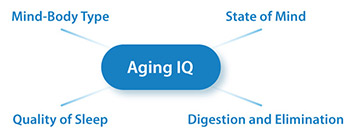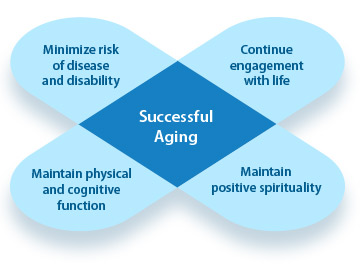
This article is the third in a series from internationally renowned physician and scientist Dr. Robert Schneider, Dean of the College of Integrative Medicine and Director of the Institute for Natural Medicine and Prevention at Maharishi University of Management. He is writing his second book, Super Aging, which integrates cutting-edge science and Maharishi AyurVeda® to offer a revolutionary approach to living longer and healthier.
According to a new study of nearly 5,000 adults, individuals who have positive beliefs about aging have half the risk for dementia compared to those who do not.1 Here modern medical science corroborates what the ancient health system of Ayurveda has been teaching for thousands of years—that our state of mind and behavior have a major influence on how well we age and how long we live.
In my first article in this series, “Secrets to a Longer, Healthier Life,” I showed how aging as we commonly know it is not inevitable. We examined successful super aging from the perspective of scientific research and Ayurvedic understanding to reveal the key role that our behavior and state of mind play in promoting longevity.

The four pillars of the Aging IQ
Your state of mind—and its influence on your behavior—are one of the four areas of life making up your Aging IQ. In my second article, we looked in depth at the rejuvenation behaviors recommended by Maharishi AyurVeda, known as Behavioral Rasayanas, and the scientific research validating this ancient system of natural health as revived by Maharishi Mahesh Yogi, Founder of the Transcendental Meditation® (TM®) technique.
These rejuvenation behaviors help us manage our mind and activity, with the goal of enhancing our aging process. This article is focused on how to personalize these behaviors based on your mind-body type.

10 Behavioral Rasayanas (Rejuvenation Behaviors) for Longevity
1. Don’t strain in your activity. Get sufficient rest. Balance rest and activity.
2. Eat a pure, balanced, healthy diet.
3. Reduce anxiety. Foster calmness.
4. Avoid anger. Stay cool and collected.
5. Be resolute and self-disciplined. Persevere. Prevent depression.
6. Respect others. Act kindly. Speak the truth. Show humility. Be compassionate. Act without violence.
7. Give to charity and help others.
8. Pursue universal or spiritual knowledge.
9. Transcend. Practice the TM technique.
10. Manage your time well—it’s the most powerful tool you have.
In this article we’ll dive more deeply into how to apply these 10 principles and rejuvenation behaviors to your unique mind-body type.
These rejuvenation behaviors help us manage our mind and activity, with the goal of enhancing our aging process.
The Original “Precision Medicine”
These 10 behavioral recommendations are universal and benefit everyone, but customizing them increases their effectiveness. In modern medicine, this personalized approach is called precision medicine. People with health concerns are grouped into subpopulations according to their health tendencies and their responses to interventions. Then treatments are tailored for them to enhance effectiveness and efficiency.
Seen in this light, we could say that Ayurveda is the original “precision medicine.”
In Ayurveda, you as a person are as important to consider as your condition. And how do we define who you are as a person? One way is by determining your mind-body type, a key component of the Aging IQ, which is a more comprehensive assessment.
The Ayurvedic principles related to physiology regard the human body to be governed by three main physiological systems, or doshas. These are called vata, pitta, and kapha. Each of us is a mixture of these doshas in varying proportions.

Vata is responsible for all movement in the body and mind. This includes movement of the blood through arteries and veins, air through the respiratory system, food through the digestive system, nerve impulses along neurons, as well as the movement of thoughts.
Pitta is responsible for transformation or metabolism. This includes digestion, energy production, and internal heat; immune system protection of the tissues; the cellular metabolism of nutrients, oxygen, and water; and even the processing of emotions.
Kapha is responsible for structure and fluid content in the body. This includes the bony skeleton, the muscular and fat tissue architecture of the body, right down to the cellular building blocks of each tissue and the brain. This element of structure gives stability to our body and mind.
All three of these doshas are present in every person. However, one dosha will usually be more prominent in our mind-body type. This predominant dosha is the one most prone to imbalance under stressful conditions.
Knowing your mind-body type reveals your basic tendencies—your strengths when in balance and your weaknesses when in imbalance. This is powerful knowledge for the treatment and prevention of illness and for fostering healthy, successful aging, or what we call super aging.
Knowing your mind-body type… is powerful knowledge for the treatment and prevention of illness and for fostering healthy, successful aging or super aging.
Take the Quiz for Personalized Rejuvenation Tips for Your Mind-Body Type
To find out what your mind-body type is, read through the following questionnaires and check all the statements that are true for you. As you click, the quiz form will sum up your results.
The quiz with the highest total indicates your predominant dosha or mind-body type. The Behavioral Rasayanas or rejuvenation behaviors for that type are personalized for your mind-body profile.
For example, if your highest score is in the Vata Quiz, click on the drop-down text at the bottom of that quiz—Show Personalized Behavioral Rasayanas for Vata Type—for guidelines individualized for your type.
If two quizzes are within a point or two, you may be “bi-doshic.” In this case, simply follow the recommendations for both mind-body types.
Are You a Vata Type?
3 Total — The Quiz with the highest total indicates your mind-body type. Click on the drop-down text below for your Personalized Behavioral Rasayanas for this type.
Show Hide Personalized Behavioral Rasayanas for Vata Type
Personalized Behavioral Rasayanas for Vata Type
To create greater balance as a Vata type, you should focus on these particular Behavioral Rasayanas. For a review of all 10 rejuvenation behaviors, see "Mind over Aging: 10 Steps to Living a Longer, Healthier, Happier Life."
Rasayana 1 Avoid getting exhausted. You like to be active, but your physical stamina is not as strong as other mind-body types, so you need to be careful not to wear yourself out. Vata tends to be irregular, so a regular routine of rest and activity will help create greater balance for you. Going to sleep and waking up at the same time every day is very important.
Rasayana 2 Eat meals regularly. Follow a Vata-pacifying diet that is freshly cooked, warm, unctuous (rich in healthy fats), and nourishing. Avoid artificial stimulants that will disrupt your system, such as excess caffeine, alcohol, or smoking. I will provide more detail about diet in a future article in this series.
Rasayana 3 Reduce anxiety. The rest provided by sufficient sleep and regular, twice-daily practice of TM will help to balance the physiological basis of your Vata mind. Anxiety is a kind of fear. Try to see problems as opportunities for learning and growth. Cultivating an optimistic outlook will help boost your confidence and reduce your stress.
Rasayana 6 Cultivate meaningful, stable relationships. Consider your thoughts before you speak to improve your communication with others. Relationships provide a source of stability and useful feedback for you .
Rasayana 8 Pursue universal or spiritual truths to help foster a sense of order in your experience of daily events. Remember the old adage, “Everything in its time and place.”
Rasayana 9 Transcend. Allow your mind to settle down regularly with TM practice. Research has shown major reductions in anxiety and improved orderliness of brain waves with the TM technique. Also, consider a TM Retreat for extended rest and relaxation.
Rasayana 10 Organize your time well. This may be challenging for you, with all your competing projects. But if you keep your values and priorities straight and align your activities with those, you will find that, with the passage of time, you will be happier and healthier.
Are You a Pitta Type?
3 Total — The Quiz with the highest total indicates your mind-body type. Click on the drop-down text below for your Personalized Behavioral Rasayanas for this type.
Show Hide Personalized Behavioral Rasayanas for Pitta Type
Personalized Behavioral Rasayanas for Pitta Type
To create greater balance as a Pitta type, you should focus on these particular Behavioral Rasayanas. For a review of all 10 rejuvenation behaviors, see "Mind over Aging: 10 Steps to Living a Longer, Healthier, Happier Life."
Rasayana 1 Chill—physically and emotionally. Since you tend to run hot, your main behavioral recommendation is to cool down. You have a tendency to overwork due to your desire to achieve. When you overwork, you can overheat. You need to play more! And be sure that some of your recreation is noncompetitive.
Rasayana 2 Don’t skip meals. Enjoy fresh, wholesome, cooling, pure foods. Hunger or thirst will make you more irritable. You need to reduce acidity and inflammation that is associated with Pitta. Avoid hot (spicy), fermented, or chemically processed foods, as well as vinegar, sour condiments, excess caffeine, alcohol, and smoking. I will provide more detail on diet in a future article in this series.
Rasayana 3 Stay cool and collected. Manage your thoughts and behavior to reduce or prevent anger. Attending to your physical need for regular rest and recreation, as described in Rasayana 1, will help to balance you. Try to see problems and unknowns as opportunities for learning and growth. Cultivate a compassionate outlook to reduce stress.
Rasayanas 6 and 7 Stay emotionally balanced and be considerate in your relationships. Be respectful and compassionate with others. Act kindly, and show humility. Focus on helping others. This will help balance your tendency for advancement at any cost.
Rasayana 8 Pursue universal or spiritual knowledge. Creating time for spiritual knowledge will help you to see the big picture and reduce irritability in favor of compassion and fulfillment. And consider getting out into nature and the outdoors more often.
Rasayana 9 Transcend. Research has shown that practicing TM regularly reduces stress hormones, anger, and blood pressure, and prevents heart disease. It also improves effectiveness and productivity at work.
Rasayana 10 Prioritize your time around fulfillment. As a Pitta type, you usually have a lengthy to-do list. Think about which items on your list will bring you deep fulfillment, and prioritize your time around those. Remember to take time for leisure, recreation, and enjoyment. This will enhance your quality of life, along with your longevity.
Are You a Kapha Type?
3 Total — The Quiz with the highest total indicates your mind-body type. Click on the drop-down text below for your Personalized Behavioral Rasayanas for this type.
Show Hide Personalized Behavioral Rasayanas for Kapha Type
Personalized Behavioral Rasayanas for Kapha Type
To create greater balance as a Kapha type, you should focus on the following Behavioral Rasayanas. For a review of all 10 rejuvenation behaviors, see "Mind over Aging: 10 Steps to Living a Longer, Healthier, Happier Life."
Rasayana 1 Wake up early. Since Kapha represents structure and stability, with imbalance you may tend to overdo structure and stability by sleeping too much. Get to sleep by 10:00 p.m. so you can wake up by 6:00 a.m. Morning is an ideal time to exercise and get activated for the day.
Rasayana 2 Moderate your diet to prevent being overweight. Your tendency to become lethargic, lack motivation, or feel blue or depressed may be related to being overweight. Since you naturally enjoy food, moderate the quantity and go easy on sweets and refined and cold foods. Instead, favor warm and spicy whole foods, especially vegetables, fruits, and whole grains, with fish and poultry in moderation. Eat your main meal at lunch, and have a light breakfast and dinner. I will provide more detail about diet in a future article in this series.
Rasayana 5 Stay active. Balance your mood and ward off depression by adding more vigorous activity, such as a vigorous walk or a dance or exercise class, to your daily routine.
Rasayanas 6 and 7 Socialize. Participate in social events that energize you. Spend time with family and friends. Avoid being alone and get out of the house. Kapha types thrive when they take on new hobbies or community service.
Rasayana 8 Pursue universal or spiritual knowledge. The pursuit of spiritual knowledge can help you to find meaning and purpose and give you more drive and directed activity in life.
Rasayana 9 Transcend. Those who practice the TM technique find that they have more dynamism and reduced depression, and research corroborates their experience. Maharishi Yoga® Asanas are also an excellent form of exercise for you. You can learn these on a TM Retreat or at your local TM Center. For more information contact your local TM Center.
Rasayana 10 Practice time management. As a Kapha type, it’s important to manage your time with alertness, rather than letting time slip away. Maintain attentive focus on your values, priorities, and activities to manage your time and aging process.
Your Unique Mental and Emotional Strengths and Tendencies

Vata type is represented by principles of movement and air. If you are predominantly a Vata type, you have the potential to be visionary, expansive, enthusiastic, and entrepreneurial. You embrace positive movement and change, are an excellent communicator, and are quick to comprehend the interconnectedness of all things.
When out of balance, however, you may tend to become anxious, worry about the future, or get easily upset and spacey. You may have trouble finishing what you’ve started. You may change your mind quickly, and be forgetful, hyperactive, prone to doubt, and overly talkative.

Pitta type is represented by the fire principle. If you are predominantly a Pitta type, when in balance, you are intelligent, clear thinking, and a dynamic leader. You seem to have an inner fire fueling forceful thinking and commanding action. You have abundant drive, prefer order, and are an excellent organizer with sustained attention. You are passionate by nature, as well as courageous, warm, and friendly.
When out of balance, you may become irritable, angry, aggressive, and hot-tempered, especially in stressful circumstances. You may tend to be perfectionistic, controlling, critical, and ambitious. Pitta types are known for “Type A” behavior and can be demanding, skeptical, resentful, or jealous.

Kapha type is represented by water and earth principles. If you are predominantly a Kapha type, when in balance, you are steady, calm, methodical, and possess an excellent memory. You tend to be sweet-natured, nurturing, emotionally stable, loyal, compassionate, forgiving, patient, receptive, and supportive.
When out of balance, you may be slow thinking, slow moving, and slow to change. You may find yourself attached to material possessions. Under stress you may become lethargic, apathetic, or depressed.
Your Passport to Successful Super Aging
In this article, we’ve shown you how to personalize your own anti-aging program by focusing on your state of mind and behavior. This is just one pillar of your Aging IQ.

The four keys to successful aging
In future articles, we will look at the other three pillars—more about mind-body types, as well as digestion and sleep. Understanding all four will provide you with your own passport to successful super aging.
Author’s note: I am grateful to Professor Dorothy Rompalske for her editorial contributions to this article.
Robert Schneider, M.D., F.A.C.C. has pursued scientific research, medical practice, and teaching of traditional systems of natural health care for the prevention of aging and related disorders, such as cardiovascular disease, for three decades. His research has been supported by $25 million in grants from the National Institutes of Health and other agencies and published in 150 scientific publications. Because of his contributions to preventing chronic disease, especially heart disease, Dr. Schneider was elected a Fellow of the American College of Cardiology. The principal author of the popular book Total Heart Health, he is currently writing his second book, Super Aging, from which this series is selected.
©2018 Robert Schneider, M.D., F.A.C.C. All rights reserved. May not be reproduced without written permission of the author.
Reference
1. Levy, B.R., Slade, M.D., Pietrzak, R.H., Ferrucci, L. “Positive Age Beliefs Protect against Dementia Even among Elders with High-Risk Gene.” PLOS ONE, 2018. 13(2) 2018: e0191004.






Thank you for this article. I would like to read the other articles too. Is it possible to post a link?
Glad you enjoyed, Lisbet. The first article, “Secrets to a Longer, Healthier Life,” can be found at https://enjoytmnews.org/secrets-to-a-longer-healthier-life/ and the second, “Mind over Aging: 10 Steps to Living a Longer, Healthier, Happier Life,” at https://enjoytmnews.org/mind-aging-10-steps-living-longer-healthier-happier-life/
Enjoy in good health!
Vata = 5, Pitta = 5, and Kapha = 3. Vata would have been 4, but the last statement was “I am generally thin-framed, yet fairly flexible, and tend to be low in stamina.” I’m small, but somewhat heavyset, but I’m very flexible for my age and my gender, and I tend to be low stamina.
In the above article I found my type with characteristics but no suggestions as to what to do with them to affect aging.
Thanks for letting us know, Andrea! I’m sorry the directions weren’t completely clear. I’ve added some clarification above (I hope). To see the suggestions for your type, click on the drop-down menu at the bottom of the quiz, Show Personalized Behavioral Rasayanas for Vata Type, which gives you longevity suggestions for your type. I hope that helps. Enjoy putting these to use!